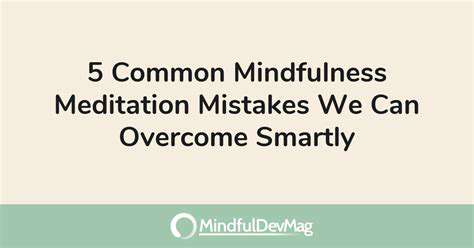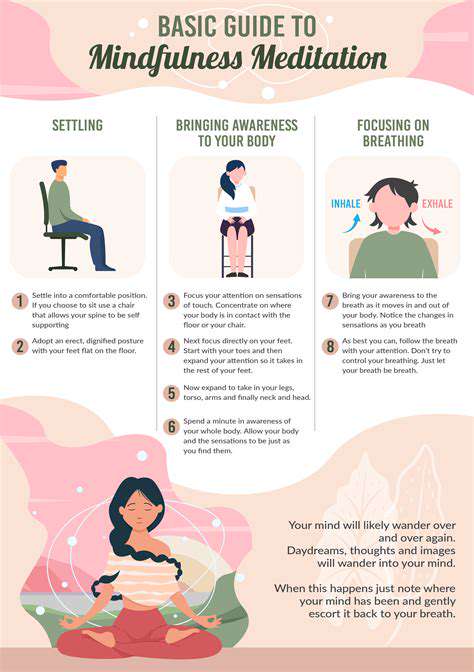Essential Guide to Mindfulness Meditation for Enhanced Well Being
The Origins and Principles of Mindfulness Meditation
The Historical Context of Mindfulness
Mindfulness meditation has roots that trace back thousands of years, primarily within various Buddhist traditions. It was developed as a practice to cultivate awareness, concentration, and a deep understanding of one's thoughts and emotions. Early texts document mindfulness as a means of achieving enlightenment, focusing on living in the present moment.
While its origins are deeply spiritual, mindfulness has evolved over the years and has been adapted into various cultures and practices across the globe. This evolution has led to broader accessibility, allowing individuals from all backgrounds to engage with mindfulness as a practical tool for personal growth and mental health.
In the late 20th century, mindfulness began to gain traction in Western psychology. It was popularized by figures like Jon Kabat-Zinn, who emphasized its therapeutic benefits in stress reduction and enhancing overall well-being. Today, mindfulness is often taught as a secular practice, making it more approachable for people who may not identify with its spiritual roots.
The Core Principles of Mindfulness Meditation
At its heart, mindfulness meditation is about awareness and presence. The primary principle is to observe one's thoughts and feelings without judgment. This practice encourages individuals to acknowledge their experiences as they are, fostering a sense of acceptance and reducing unnecessary stress.
Another core principle is the practice of focused attention. Mindfulness meditation often involves concentrating on the breath, bodily sensations, or a specific mantra. This focus helps anchor the mind and cultivates the ability to return to the present moment, particularly during times of distraction or anxiety.
Additionally, mindfulness emphasizes an attitude of non-reactivity. By observing thoughts and emotions without immediately reacting, individuals can develop a greater sense of control over their responses. This principle not only enhances emotional regulation but can also lead to more thoughtful decision-making in everyday life.
The Benefits of Practicing Mindfulness Meditation
Practicing mindfulness meditation offers several benefits for mental and emotional well-being. Research has shown that regular mindfulness practice can reduce symptoms of anxiety and depression. By fostering a more balanced state of mind, individuals may find it easier to manage stress and negative emotions.
Mindfulness has also been linked to improved focus and cognitive flexibility. When individuals learn to concentrate on the present moment, they may experience enhanced attention skills and the ability to shift perspectives more fluidly. This can lead to better problem-solving abilities both in personal and professional contexts.
Moreover, cultivating mindfulness can lead to a more compassionate view toward oneself and others. As individuals learn to observe their thoughts and feelings without judgment, they often become more empathetic, fostering healthier relationships. The practice encourages kindness, not just toward others but also toward oneself, leading to a more positive self-image and overall sense of fulfillment.
Benefits of Mindfulness Meditation
Improved Mental Clarity
One of the primary benefits of mindfulness meditation is enhanced mental clarity. When individuals practice mindfulness, they learn to focus their thoughts and eliminate distractions. This clarity can lead to better decision-making and problem-solving skills.
By practicing mindfulness regularly, individuals can train their brains to become more alert and engaged. This heightened awareness allows for a more profound understanding of thoughts and emotions, creating a clearer mental pathway for processing information.
Moreover, improved mental clarity can reduce the tendency to ruminate—a common negative thought pattern. By redirecting attention, individuals can experience a reduction in anxiety and stress, leading to more positive mental health outcomes.
Overall, the commitment to mindfulness meditation can significantly impact cognitive functions, enabling more effective functioning in both personal and professional life.
Enhanced Emotional Regulation
Mindfulness meditation also contributes greatly to emotional regulation. As individuals learn to observe their thoughts and feelings without judgment, they cultivate a more profound understanding of their emotional responses. This insight can empower them to manage their emotions effectively.
Research indicates that those who practice mindfulness regularly exhibit less reactivity to stressful situations. They are better able to pause and reflect before responding, resulting in more thoughtful actions rather than impulsive reactions.
The regular practice of mindfulness can lead to increased resilience against emotional distress. Individuals may find themselves less overwhelmed by negative feelings, ultimately fostering a more balanced emotional state over time.
As emotional regulation improves, individuals may experience heightened well-being and interactions, leading to healthier relationships and social dynamics.
Reduction of Stress and Anxiety
One of the most celebrated benefits of mindfulness meditation is its ability to reduce stress and anxiety. Through various techniques, such as deep breathing and focused attention, individuals are equipped to handle stressors more effectively.
Mindfulness allows for a moment-to-moment awareness, drawing attention away from future worries or past regrets that typically contribute to anxiety. This shift in focus helps individuals experience a sense of calm and grounding.
Studies have shown that mindfulness meditation can lower cortisol levels, the hormone associated with stress. As individuals develop a regular meditation practice, they are likely to experience an overall decrease in stress-related symptoms.
By investing time in mindfulness meditation, individuals cultivate a greater sense of peace and resilience, enhancing their overall ability to navigate life's challenges.
Promotion of Overall Well-Being
Beyond the immediate benefits of improved mental clarity, emotional regulation, and reduced stress, mindfulness meditation promotes overall well-being. The practice encourages a holistic approach to health, balancing mind, body, and spirit.
Engaging in mindfulness fosters self-awareness and self-acceptance, allowing individuals to appreciate their strengths and weaknesses. This sense of acceptance can lead to higher levels of self-esteem and contentment in life.
In addition to the psychological benefits, mindfulness has been linked to physical health improvements. People who practice mindfulness often report better sleep patterns, lower blood pressure, and reduced physical symptoms of stress.
Ultimately, the promotion of overall well-being through mindfulness meditation creates a life filled with greater joy, purpose, and fulfillment, making it an essential practice for those seeking a balanced lifestyle.
How to Start Your Mindfulness Meditation Practice

Choosing the Right Environment
When beginning your mindfulness meditation practice, it’s essential to select an environment that promotes calmness and focus. Look for a quiet space where you are less likely to be interrupted, as this can significantly enhance your experience.
Consider incorporating soft lighting and comfortable seating to make this space inviting. Creating a dedicated meditation area will encourage consistency in your practice, ultimately leading to greater benefits over time.
Establishing a Meditation Routine
Establishing a consistent meditation routine can help solidify your practice and make it easier to integrate into your daily life. Start with short sessions, perhaps five to ten minutes, and gradually increase the duration as you become more comfortable.
Choosing a specific time each day for your meditation can also foster a sense of commitment. Having a regular practice can significantly improve your mental clarity and emotional stability, contributing to overall well-being.
Overcoming Common Challenges in Mindfulness Meditation

Understanding the Barriers to Mindfulness Meditation
Many individuals face various challenges when trying to practice mindfulness meditation. These barriers can stem from personal expectations, external distractions, and even physical discomforts. Recognizing these issues is the first step towards overcoming them. For instance, it's common for newcomers to feel frustrated when their minds wander during meditation, which is a natural part of the process. By acknowledging that such distractions are normal, practitioners can approach their meditation sessions with patience and compassion.
Another significant barrier is the lack of time. Many individuals live busy lives and feel that they cannot allocate time to sit quietly and meditate. In reality, even a few minutes of mindfulness each day can lead to meaningful benefits. It might be beneficial to integrate short mindfulness practices into daily routines, such as during a lunch break or while commuting.
Physical discomfort can also hinder the meditation experience. Sitting still for extended periods may lead to restlessness or pain. To address this, practitioners can experiment with different postures or even practice mindful walking or standing meditation, making the experience more comfortable and enjoyable. Additionally, using cushions or supportive furniture can help alleviate physical strain.
A lack of guidance and direction can also impede progress in mindfulness meditation. Many seekers may feel uncertain about their techniques or the principles of mindfulness. Enrolling in a class, using guided meditation apps, or reading books on mindfulness can offer valuable insights and support. Finding a community or a buddy to meditate with can also enhance motivation and accountability.
Lastly, unrealistic expectations can lead to disappointment. Individuals often hope for immediate results, such as stress relief or heightened awareness. It’s important to understand that mindfulness is a practice that develops over time, and patience is key. Being open to the journey, rather than fixating on outcomes, can transform one’s meditation experience.
Strategies for Cultivating a Successful Mindfulness Practice
To cultivate a successful mindfulness meditation practice, it's crucial to set realistic goals. Setting achievable objectives helps maintain motivation and reduces the chances of feeling overwhelmed. Starting with just a few minutes of mindful breathing each day can establish a foundation for deeper practice over time. As comfort with the practice grows, the duration and complexity can gradually increase.
Creating a conducive environment for meditation is another effective strategy. Choose a quiet, comfortable space where distractions are minimized. Adding elements such as soft lighting, comfortable seating, and calming scents can enhance the overall experience. This dedicated space will signal to your mind that it’s time to engage in mindfulness, fostering consistency in practice.
Incorporating mindfulness into daily activities can also enhance the practice. Whether it’s eating, walking, or even washing dishes, focusing fully on the present moment during these activities can deepen mindfulness. This approach allows individuals to build their mindfulness muscle throughout the day, making it feel less like a chore and more like a way of life.
Engaging with various mindfulness techniques can keep the practice fresh and engaging. Experiment with different approaches—such as loving-kindness meditation, body scans, or guided imagery—to discover what resonates best with you. Switching up the techniques can provide new insights and prevent routine boredom. It’s essential to remain flexible and open-minded in our practices.
Finally, self-compassion plays a crucial role in the mindfulness journey. Meditation is not about achieving perfection but about embracing experiences as they come. When facing challenges or setbacks, treating oneself with kindness and understanding can foster growth and resilience. Acknowledging that everyone struggles at times can create a supportive inner dialogue, enhancing overall well-being.
The Impact of Mindfulness Meditation on Daily Life

The Benefits of Mindfulness Meditation
Mindfulness meditation offers numerous benefits that can significantly enhance well-being. Regular practice can lead to reduced stress and anxiety levels, allowing individuals to navigate life’s challenges more effectively.
Additionally, it promotes emotional regulation and a greater sense of inner peace, further contributing to mental clarity and focus.
How to Incorporate Mindfulness into Daily Routine
Incorporating mindfulness into your daily routine doesn't have to be time-consuming. Simple practices, such as taking a few deep breaths before starting your day, can make a profound difference.
Setting aside just a few minutes for meditation during lunch breaks or after work allows for moments of reflection and stress relief, helping to create a routine that promotes enhanced well-being.
Overcoming Challenges in Mindfulness Practice
Many individuals face challenges when starting their mindfulness journey, such as distractions or difficulty concentrating. Understanding that these challenges are common can help reduce frustration and foster persistence.
Practicing self-compassion and understanding that mindfulness is a skill that develops over time is essential. Regular engagement, even in short bursts, can lead to significant improvements in your practice.
The Science Behind Mindfulness Meditation
Research has shown that mindfulness meditation is linked to changes in brain structure and function. Studies indicate that consistent practice can increase gray matter density in areas of the brain associated with emotional regulation and stress response.
This evidence underscores the potential of mindfulness meditation not only for enhancing psychological well-being but also for promoting overall cognitive health.